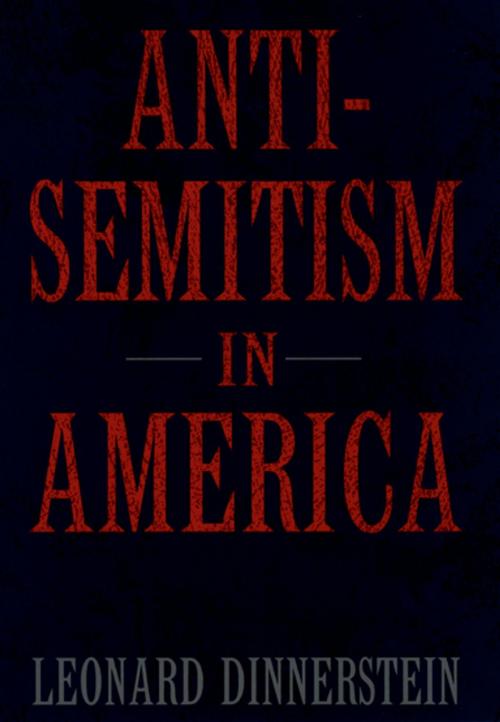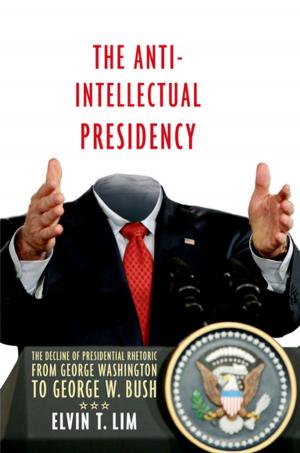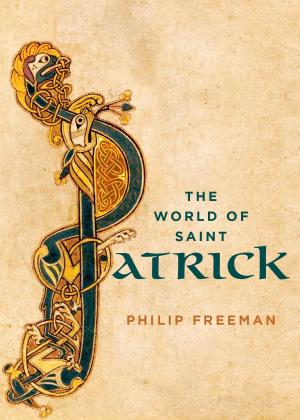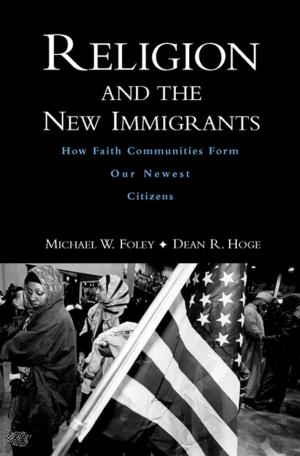Antisemitism in America
Nonfiction, History, Jewish, Social & Cultural Studies, Social Science, Discrimination & Race Relations, Americas, United States| Author: | Leonard Dinnerstein | ISBN: | 9780190282820 |
| Publisher: | Oxford University Press | Publication: | November 2, 1995 |
| Imprint: | Oxford University Press | Language: | English |
| Author: | Leonard Dinnerstein |
| ISBN: | 9780190282820 |
| Publisher: | Oxford University Press |
| Publication: | November 2, 1995 |
| Imprint: | Oxford University Press |
| Language: | English |
Is antisemitism on the rise in America? Did the "hymietown" comment by Jesse Jackson and the Crown Heights riot signal a resurgence of antisemitism among blacks? The surprising answer to both questions, according to Leonard Dinnerstein, is no--Jews have never been more at home in America. But what we are seeing today, he writes, are the well-publicized results of a long tradition of prejudice, suspicion, and hatred against Jews--the direct product of the Christian teachings underlying so much of America's national heritage. In Antisemitism in America, Leonard Dinnerstein provides a landmark work--the first comprehensive history of prejudice against Jews in the United States, from colonial times to the present. His richly documented book traces American antisemitism from its roots in the dawn of the Christian era and arrival of the first European settlers, to its peak during World War II and its present day permutations--with separate chapters on antisemititsm in the South and among African-Americans, showing that prejudice among both whites and blacks flowed from the same stream of Southern evangelical Christianity. He shows, for example, that non-Christians were excluded from voting (in Rhode Island until 1842, North Carolina until 1868, and in New Hampshire until 1877), and demonstrates how the Civil War brought a new wave of antisemitism as both sides assumed that Jews supported with the enemy. We see how the decades that followed marked the emergence of a full-fledged antisemitic society, as Christian Americans excluded Jews from their social circles, and how antisemetic fervor climbed higher after the turn of the century, accelerated by eugenicists, fear of Bolshevism, the publications of Henry Ford, and the Depression. Dinnerstein goes on to explain that just before our entry into World War II, antisemitism reached a climax, as Father Coughlin attacked Jews over the airwaves (with the support of much of the Catholic clergy) and Charles Lindbergh delivered an openly antisemitic speech to an isolationist meeting. After the war, Dinnerstein tells us, with fresh economic opportunities and increased activities by civil rights advocates, antisemititsm went into sharp decline--though it frequently appeared in shockingly high places, including statements by Nixon and his Chairman of the Joint Chiefs of Staff. "It must also be emphasized," Dinnerstein writes, "that in no Christian country has antisemitism been weaker than it has been in the United States," with its traditions of tolerance, diversity, and a secular national government. This book, however, reveals in disturbing detail the resilience, and vehemence, of this ugly prejudice. Penetrating, authoritative, and frequently alarming, this is the definitive account of a plague that refuses to go away.
Is antisemitism on the rise in America? Did the "hymietown" comment by Jesse Jackson and the Crown Heights riot signal a resurgence of antisemitism among blacks? The surprising answer to both questions, according to Leonard Dinnerstein, is no--Jews have never been more at home in America. But what we are seeing today, he writes, are the well-publicized results of a long tradition of prejudice, suspicion, and hatred against Jews--the direct product of the Christian teachings underlying so much of America's national heritage. In Antisemitism in America, Leonard Dinnerstein provides a landmark work--the first comprehensive history of prejudice against Jews in the United States, from colonial times to the present. His richly documented book traces American antisemitism from its roots in the dawn of the Christian era and arrival of the first European settlers, to its peak during World War II and its present day permutations--with separate chapters on antisemititsm in the South and among African-Americans, showing that prejudice among both whites and blacks flowed from the same stream of Southern evangelical Christianity. He shows, for example, that non-Christians were excluded from voting (in Rhode Island until 1842, North Carolina until 1868, and in New Hampshire until 1877), and demonstrates how the Civil War brought a new wave of antisemitism as both sides assumed that Jews supported with the enemy. We see how the decades that followed marked the emergence of a full-fledged antisemitic society, as Christian Americans excluded Jews from their social circles, and how antisemetic fervor climbed higher after the turn of the century, accelerated by eugenicists, fear of Bolshevism, the publications of Henry Ford, and the Depression. Dinnerstein goes on to explain that just before our entry into World War II, antisemitism reached a climax, as Father Coughlin attacked Jews over the airwaves (with the support of much of the Catholic clergy) and Charles Lindbergh delivered an openly antisemitic speech to an isolationist meeting. After the war, Dinnerstein tells us, with fresh economic opportunities and increased activities by civil rights advocates, antisemititsm went into sharp decline--though it frequently appeared in shockingly high places, including statements by Nixon and his Chairman of the Joint Chiefs of Staff. "It must also be emphasized," Dinnerstein writes, "that in no Christian country has antisemitism been weaker than it has been in the United States," with its traditions of tolerance, diversity, and a secular national government. This book, however, reveals in disturbing detail the resilience, and vehemence, of this ugly prejudice. Penetrating, authoritative, and frequently alarming, this is the definitive account of a plague that refuses to go away.















